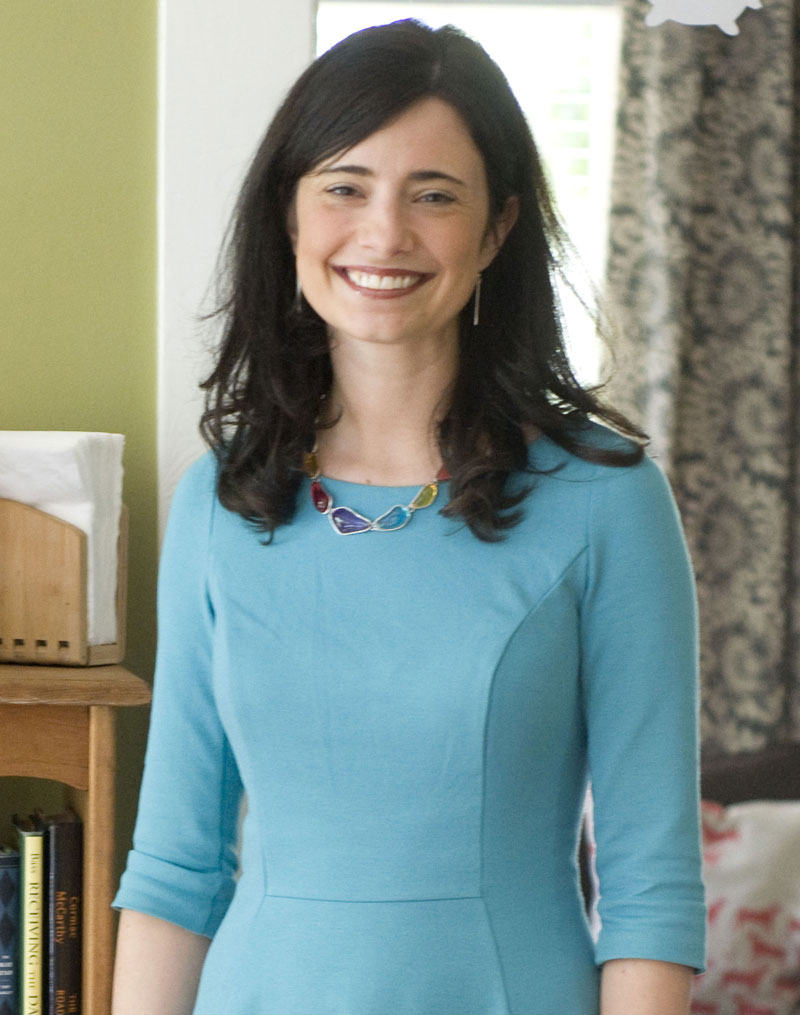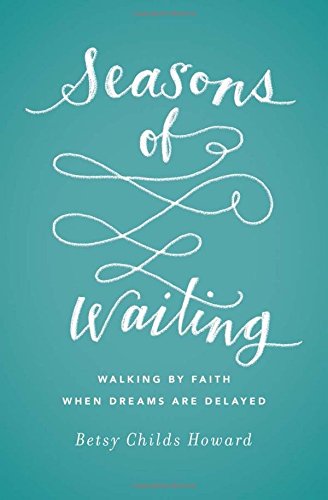Waiting is not likely your favorite pastime, but we all do a lot of it. And sometimes that waiting can be painful. So what does waiting look like in Christian perspective?
Greetings, I’m Fred Zaspel, executive editor here at Books At a Glance, and that’s what we’re talking about today with Betsy Childs Howard, author of the new book, Seasons of Waiting: Walking by Faith When Dreams are Delayed.
Welcome, Betsy, it’s good to have you with us!
Betsy Childs Howard:
Thank you so much.
Fred Zaspel:
First off, could you just introduce yourself for our listeners? Tell us about yourself. This is your first book, I think, but this may not be the first time our readers have seen your name. Tell us about yourself.
Howard:
I live in New York City with my husband and I work for the Gospel Coalition as an editor. Primarily I oversee our podcasts. We have three different podcasts. One is a sermon podcast called TGC Word of the Week, one is a podcast for Bible teachers called help me teach the Bible with Nancy Guthrie, and the third is our general podcast called The Gospel Coalition. I work on all three of those. Then I also oversee the special publishing projects and from time to time I write articles for the Gospel Coalition.
Zaspel:
And your husband is planting a church in New York. Is that right?
Howard:
Yes, he is an Anglican pastor from England and we are planting a new church in Manhattan.
Zaspel:
Okay, about your book – tell us what you mean by “seasons of waiting.”
Howard:
Well, seasons of waiting occur in every Christian’s life, every person’s life. Christians are concerned about how to wait well during those seasons. Sometimes it may be a short season. You may be waiting on a job or waiting on something for a finite length of time. Other times a season could last your whole life. So Christians are concerned to wait well in these seasons of waiting, whether it’s waiting for a spouse, waiting for a child or waiting for God to show you what you want to do with your life. So I wanted to look at the seasons through a lens of biblical theology.
Zaspel
How did this topic come to be of interest to you?
Howard:
It really came of interest to me out of my personal life. I have always wanted to be married and I was single for longer than I would have liked to be. I never knew whether God was going to bring me a husband or not. I don’t think that is what he has chosen for all of us and I was aware that I might be single for the rest of my life. That was hard for me because I didn’t know if that season was going to end or if God was going to allow me to get married. One of the things I wrestled with theologically was if God chose not to let me be married, why I wouldn’t get to represent the theological picture he gives us of Christ and the church. Because we learn in Ephesians 5 that the marriage relationship between a husband and a wife represents Christ and the church and I couldn’t understand why, if I was to remain single, I wouldn’t get to play a part in that theological picture.
So as I studied the Scriptures I realized that singleness, or a bride waiting for a bridegroom was also a very prominent theme in the New Testament, because the church is waiting for Christ. And the church is supposed to eagerly long for the return of Christ. We get a picture of a bride waiting… We have the parable of the bridesmaids waiting for the bridegroom to come with their lamps. They are ready, they are watching and they are praying. And as I discovered that theme, it helped me see that that season of waiting, that singleness, could really point to a certain aspect of the gospel in a way that the marriage relationship doesn’t. That you need that picture of the bride waiting for the bridegroom, then to have the culmination of the marriage metaphor.
So as I started to see that, it really helped me. It didn’t take away all of the difficulties of singleness, but it helped me to have theological purpose. And I started thinking about other seasons of waiting and about whether there were similar theological purposes for those. So that’s really how I got interested in it and wanting to wait well even if that waiting was going to last for a lifetime, because I knew that if I was single until I died I would ultimately still find the fulfillment. My waiting would end because I would be part of the church which is the bride of Christ. So I wanted to help people get a glimpse of that eager, groaning kind of waiting that can still honor God. That it’s not necessarily the same thing as discontentment.
Zaspel:
The focus of your book is broader than just waiting for marriage, right?
Howard:
Yes.
Zaspel:
What are some other areas you might address?
Howard:
I talk about waiting in general and how God takes us into what Andrew Murray calls ‘the School of Waiting.’ Waiting can teach us something, and many Christians are familiar with that. They may think that God is trying to sanctify them and that is very true, but I think there is more to it than that. I think when we think of ‘the school of waiting,’ or a waiting season we are tempted to think, “I need to learn my lesson. I need to see what God is teaching me so that I won’t have to wait anymore.” That’s a common way of thinking, that if I could just learn what God wants to teach me, I won’t have to wait anymore.
But I believe actually God wants us to learn how to wait well so that we can go on waiting well for a lifetime whether it’s in the same season or through new seasons. So now I’m married, I’m not waiting on a bridegroom anymore, but there are many other things that I waiting on such as this church plant that my husband and I are working on. It’s been a very difficult road and the same lessons that God taught me in the school of waiting for singleness he is now teaching me in the slightest school of waiting that I am walking through. I want to help Christians understand that the goal is not to stop waiting. The goal is to wait well in whatever season that you are in.
Zaspel:
Just for context, tell us about the place of waiting in the Christian life, broadly speaking. Then you are taking that and narrowing it, right?
Howard:
Yes. That school of waiting is the broad idea and then more narrowly I address five different kinds of waiting that are all biblical themes. They are all part of God’s story of salvation the first that I mentioned is waiting for bridegroom. We see that in the church waiting for the return of Christ.
Also I talk about waiting for a child. We see many barren women in the Bible. I believe all of them go on to have children but they all represent Israel waiting for the coming of the Messiah. Elizabeth is the example that I use in the book, the wife of Zechariah, who was past childbearing. She had waited years for a child and then God gave her John the Baptist. And when he gave her John the Baptist he also signified that the wait of Israel was ended. I try to help women see how those who are waiting on a child are also in a theologically significant role.
Other types of waiting that I address are waiting for a home – that’s something that many people feel whether they have moved around a lot, they may be in the Army, or it may be that they are far from family, or it may be that they are homeless or that they have never had a stable home life. So, waiting for a home is one and that theme of wandering in the wilderness, waiting for the promised land, is all through the Scriptures.
The fourth topic is waiting for healing. We see Jesus healing many people and, through his healing, showing that his kingdom had come. But before those healings, you have people like the women who had an issue of blood for years waiting for healing and how those who want to be healed but have not yet been healed can see God working in their waiting, even as they continue to long for healing.
And then the last subject that I cover is waiting for a prodigal. In that I address both prodigal sons and daughters, people whose children have either left the faith or have rebelled against them, as well as prodigal spouses. People whose spouses are unfaithful or perhaps who are still faithful to them but have left the faith or are not following Christ. That one is an easy one because we have the parable of the prodigal son. It helps people see how, just as the parable of the prodigal son teaches us about the gospel in the father’s loving heart, so waiting on a prodigal in our own lives and show the gospel in the same way.
Zaspel:
So waiting on God in whatever particular circumstances is about more than just learning patience.
Howard:
Definitely. We do need to learn patience, but there are times when God doesn’t remove our desires. He does want us to live with unmet desires as a way of representing what the church is meant to be in this life. We are not meant to be at home. We should be longing for a better country, a heavenly one as it says in Hebrews. In the same way, if you are longing for a baby or longing for a home or longing for a spouse, God may not give you those things, but that unmet longing can show you and those around you that you are not meant for this world and that your desires are ultimately pointing to the next world where they will be fulfilled.
Fred Zaspel:
What audience do you have in mind?
Howard:
The book is primarily written to women, but I’m happy for men to read it as well. I want women of diverse ages and stages to be able to read it and hopefully read it together, because I think that even though the things we are waiting for are different, we have many things in common and we have the same God and he is telling the same gospel story through our lives.
So I hope that women won’t just read the chapter that applies to them, but that they’ll read all the chapters and talk about it with women in different seasons of waiting than the one that they are in. It would be a good book for a women’s group to go through or a women’s Sunday school class to study together to help them see the commonality even though they are waiting for different things.
Zaspel:
We’re talking to Betsy Childs Howard, author of the brand new book, Seasons of Waiting: Walking by Faith When Dreams are Delayed. It’s a very practical exploration of what it means to trust God, and we encourage you to get a copy and enjoy!
Betsy, thanks for talking to us today.
Howard:
Thank you so much, it was great to talk to you!

